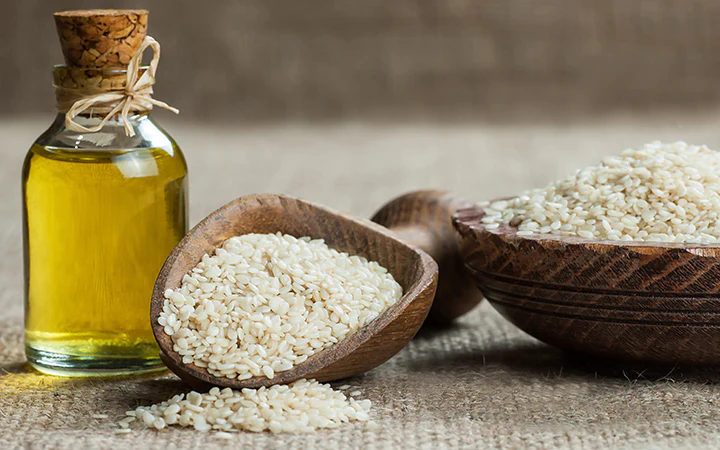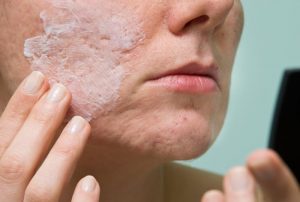
Sesame Oil for Skin
Sesame oil, derived from the seeds of the sesame plant, has been used for centuries in various cultures for its numerous health benefits. Beyond its culinary uses, sesame oil offers several advantages for the skin, making it a popular choice in skincare routines. In this article, we will explore the benefits of sesame oil for the skin and provide tips on how to incorporate it into your skincare regimen effectively.
Sesame oil is a natural oil extracted from sesame seeds, which are rich in essential fatty acids, antioxidants, vitamins, and minerals. These components contribute to its beneficial effects on the skin.
Nutritional Composition of Sesame Oil
Sesame oil is packed with essential nutrients that promote skin health. It contains a high concentration of vitamins E and K, which nourish the skin and protect it from damage. Additionally, sesame oil contains minerals such as calcium, magnesium, and phosphorus that support healthy skin cell regeneration.
Benefits of Sesame Oil for Skin
Sesame oil, derived from sesame seeds, is not only a popular cooking oil but also offers a range of benefits for the skin. Packed with essential nutrients and natural compounds, sesame oil can nourish and enhance the health of your skin. In this article, we will explore the benefits of sesame oil for the skin, its nutritional composition, safety considerations, and how to use it effectively for acne.
Hydrates and Moisturizes
Sesame oil acts as an excellent natural moisturizer for the skin. Its emollient properties help to lock in moisture, keeping the skin soft, supple, and hydrated. Regular use of sesame oil can prevent dryness and flakiness, especially in individuals with dry or sensitive skin.
Anti-Aging Properties
The antioxidants present in sesame oil, such as sesamol and sesaminol, help combat the harmful effects of free radicals, which contribute to premature aging. These antioxidants neutralize free radicals, reducing the appearance of fine lines, wrinkles, and age spots, and promoting a more youthful complexion.
Soothes Inflammation and Irritation
Sesame oil possesses anti-inflammatory properties that can soothe and calm irritated skin. It can provide relief from conditions like eczema, psoriasis, and dermatitis. The oil’s soothing effect helps reduce redness, itching, and inflammation, promoting healthier-looking skin.
Protects Against Sun Damage
Sesame oil contains natural sunscreen properties, acting as a barrier against harmful ultraviolet (UV) rays. When applied topically, it forms a protective layer on the skin, preventing sunburn and reducing the risk of sun damage. However, it is important to note that sesame oil alone may not provide sufficient protection against intense sun exposure, so it should be used in conjunction with proper sun protection measures.
Fights Acne and Blemishes
Sesame oil possesses antibacterial and anti-inflammatory properties that make it effective in treating acne and reducing blemishes. Its antimicrobial properties help fight acne-causing bacteria, while its anti-inflammatory nature reduces redness and swelling associated with breakouts. Applying a small amount of sesame oil to the affected areas can help clear up acne and promote a clearer complexion.
Enhances Skin Health
In addition to the specific benefits mentioned above, sesame oil overall enhances the health and appearance of the skin. Its nourishing properties help improve skin texture, tone, and elasticity, giving it a youthful and radiant glow. Regular use of sesame oil can also help balance oil production, making it suitable for both dry and oily skin types.
How to Use Sesame Oil for Skin
Sesame oil can be beneficial for acne-prone skin due to its antibacterial and anti-inflammatory properties. Here’s how to use sesame oil effectively for acne:
- Spot Treatment: Apply a small amount of sesame oil directly to individual acne spots or blemishes using a clean cotton swab or your fingertips. Gently massage the oil into the affected areas and leave it on overnight. Rinse off the next morning with lukewarm water.
- Oil Cleansing: Use sesame oil as part of your oil cleansing routine. Massage a generous amount of sesame oil onto your face, focusing on areas prone to breakouts. This helps dissolve excess sebum, dirt, and impurities without stripping the skin’s natural oils. Remove the oil by wiping it off with a warm, damp washcloth, and follow with a gentle cleanser.
- Moisturizer: After cleansing your face, apply a few drops of sesame oil as a lightweight moisturizer. It helps hydrate the skin and maintain its moisture balance, which can prevent excessive oil production and breakouts. Massage the oil into your skin until fully absorbed.
- Oil Blending: Mix a few drops of sesame oil with other acne-fighting essential oils like tea tree oil or lavender oil. This combination can enhance the antimicrobial and anti-inflammatory properties of sesame oil, providing a more potent treatment for acne. Dilute the essential oils properly and perform a patch test before applying the blend to your face.
Remember, consistency is key when using sesame oil for acne. It may take time to see noticeable improvements, so be patient and continue with your skincare routine.
Facial Cleansing
Use sesame oil as a natural facial cleanser by massaging a small amount onto your skin. This helps dissolve dirt, makeup, and impurities while nourishing the skin. Rinse with warm water and pat dry for a refreshed and clean face.
Massage Oil
Sesame oil can be used as a massage oil to promote relaxation and rejuvenation. Warm the oil slightly and massage it onto your body, focusing on areas that need extra moisture or attention. This helps improve blood circulation, soothes tired muscles, and leaves your skin feeling soft and smooth.
Natural Moisturizer
After cleansing your face or body, apply a few drops of sesame oil to moisturize your skin. Gently massage it into your skin until fully absorbed. The oil’s hydrating properties help maintain the skin’s moisture balance, leaving it moisturized and nourished throughout the day.
Makeup Remover
Sesame oil can be an effective and gentle makeup remover. Apply a small amount of oil to a cotton pad and use it to wipe away your makeup, including stubborn waterproof mascara. The oil effectively dissolves makeup while nourishing the skin, leaving it clean and refreshed.
Scalp and Hair Care
Sesame oil is also beneficial for scalp and hair health. Massage warm sesame oil into your scalp to stimulate circulation and promote healthy hair growth. You can also apply a few drops of oil to the ends of your hair to nourish and add shine.
What Nutrients Does Sesame Oil Have?
Sesame oil is rich in various nutrients that contribute to its beneficial effects on the skin. It contains essential fatty acids like omega-6 and omega-9, which help maintain the skin’s barrier function and keep it hydrated. Sesame oil is also a good source of vitamin E, an antioxidant that protects the skin from damage caused by free radicals. Additionally, it contains minerals such as calcium, magnesium, and zinc, which support healthy skin cell function and regeneration.
Is It Safe to Use Sesame Oil on Your Skin?
Yes, sesame oil is generally safe to use on the skin. However, it’s important to note that everyone’s skin is different, and some individuals may be sensitive or allergic to sesame oil. Before applying it to a larger area of your skin, perform a patch test by applying a small amount of oil to a small patch of skin and observing for any adverse reactions. If redness, itching, or irritation occurs, discontinue use. It’s also advisable to consult with a dermatologist if you have any existing skin conditions or concerns.
Precautions to Be Taken While Using Sesame Oil
While sesame oil is generally safe to use, there are a few precautions to keep in mind:
- Allergies: If you have a known allergy to sesame seeds or sesame products, avoid using sesame oil on your skin.
- PatchTest: Always perform a patch test before using sesame oil on a larger area of your skin. Apply a small amount of oil to a small patch of skin and wait for 24 hours to check for any adverse reactions.
- Sun Sensitivity: Sesame oil may increase photosensitivity in some individuals. If you plan to use sesame oil during the day, make sure to apply sunscreen or take other sun protection measures to avoid sunburn or skin damage.
- Quality: Use high-quality, cold-pressed sesame oil for the best results. Ensure that the oil is pure and free from any additives or contaminants.
- Individual Sensitivity: Everyone’s skin is different, and while sesame oil is generally well-tolerated, it’s important to pay attention to how your skin reacts. If you experience any irritation, redness, or discomfort, discontinue use and consult a dermatologist.
Incorporating sesame oil into your skincare routine can provide numerous benefits for your skin, including hydration, nourishment, and acne-fighting properties. However, it’s essential to be mindful of any potential allergies or sensitivities and use the oil in moderation.
In conclusion, sesame oil offers a range of benefits for the skin, thanks to its nutrient composition and natural properties. From providing hydration and nourishment to fighting acne, sesame oil can be a valuable addition to your skincare regimen. Remember to patch test, be cautious of sun sensitivity, and choose a high-quality oil. With proper usage and consistency, you can enjoy the advantages of sesame oil for healthy and radiant skin.
Precautions and Side Effects
While sesame oil is generally safe for most people, it is essential to perform a patch test before using it on a larger area of the skin. Some individuals may have an allergic reaction or sensitivity to sesame oil. If any redness, itching, or irritation occurs, discontinue use immediately.
Additionally, be cautious when using sesame oil in direct sunlight as it may increase photosensitivity in some individuals. Always use sunscreen and other protective measures when exposed to the sun.
Sesame Oil for Acne: Benefits and Usage Tips
Acne, a common skin condition, can be frustrating to deal with. If you’re seeking a natural remedy, sesame oil may be a beneficial option. With its unique properties, sesame oil offers several benefits for acne-prone skin. In this article, we will explore how sesame oil benefits acne, its anti-inflammatory and antioxidant effects, usage tips for incorporating it into your skincare routine, potential side effects, and alternative natural remedies for acne.
How Does Sesame Oil Benefit Acne-Prone Skin?
Sesame oil offers several benefits for acne-prone skin:
- Antibacterial Properties: Sesame oil possesses natural antibacterial properties that help combat acne-causing bacteria. When applied to the skin, it can inhibit the growth of bacteria, reducing the occurrence of breakouts.
- Anti-Inflammatory Effects: Inflammation plays a significant role in acne development. Sesame oil contains compounds that have anti-inflammatory properties, helping to reduce redness, swelling, and discomfort associated with acne.
- Moisturizing and Hydrating: Contrary to popular belief, acne-prone skin needs adequate hydration. Sesame oil acts as a lightweight moisturizer, nourishing the skin without clogging pores. Proper hydration helps maintain the skin’s natural barrier and promotes healthier skin.
- Regulation of Sebum Production: Excessive sebum production is a contributing factor to acne. Sesame oil has been found to help regulate sebum production, preventing the skin from becoming too oily and reducing the occurrence of acne breakouts.
The Antioxidant Effects of Sesame Oil and Their Impact on Acne
Sesame oil contains powerful antioxidants, such as sesamol and sesaminol, which provide several benefits for acne-prone skin. These antioxidants help neutralize free radicals, which are unstable molecules that can cause damage to the skin cells. By reducing oxidative stress, sesame oil can help prevent inflammation and minimize the severity of acne breakouts.
Additionally, antioxidants in sesame oil contribute to the overall health and appearance of the skin. They support the skin’s natural repair process, promote a more balanced complexion, and may even help fade acne scars over time.
Incorporating Sesame Oil into Your Skincare Routine for Acne
Here are some tips for incorporating sesame oil into your skincare routine to help with acne:
- Spot Treatment: Apply a small amount of sesame oil directly to individual acne spots or blemishes using a clean cotton swab or your fingertips. Leave it on overnight and rinse off in the morning.
- Oil Cleansing: Use sesame oil as part of the oil cleansing method. Massage a generous amount of sesame oil onto your face, focusing on areas prone to acne. Gently remove the oil with a warm, damp washcloth, followed by a gentle cleanser.
- Moisturizer: After cleansing your face, apply a few drops of sesame oil as a moisturizer. Massage it into your skin until fully absorbed. This helps hydrate the skin and maintain a healthy moisture balance.
- Blending with Essential Oils: Consider blending sesame oil with other acne-fighting essential oils like tea tree oil or lavender oil. Dilute the essential oils properly and perform a patch test before applying the blend to your face.
Sesame Oil Suitability for All Skin Types
Sesame oil is generally suitable for all skin types, including acne-prone skin. It is lightweight and non-comedogenic, meaning it won’t clog pores or contribute to further breakouts. However, every individual’s skin is unique, so it’s important to perform a patch test before applying sesame oil to a larger area of your face. This will help determine if you have any specific sensitivities or allergies to sesame oil.
Potential Side Effects or Allergies Associated with Sesame Oil
While sesame oil is generally safe for most people, there is a possibility of allergic reactions or sensitivities. If you experience any redness, itching, or irritation after using sesame oil, discontinue use and consult a dermatologist. Additionally, if you have a known allergy to sesame seeds or sesame products, it’s best to avoid using sesame oil on your skin.
Can Sesame Oil Effectively Treat Hormonal Acne?
Hormonal acne is typically caused by hormonal fluctuations in the body and is often characterized by deep, painful cystic acne along the jawline and chin. While sesame oil may help with reducing inflammation and bacterial growth associated with acne, it may not address the underlying hormonal imbalance causing hormonal acne. It is recommended to consult a dermatologist or healthcare professional for personalized treatment options if you’re specifically dealing with hormonal acne.
Alternative Natural Remedies for Acne
In addition to sesame oil, several other natural remedies can help manage acne:
- Tea Tree Oil: Tea tree oil possesses antibacterial properties and can help reduce acne-causing bacteria on the skin.
- Aloe Vera: Aloe vera has soothing and anti-inflammatory effects, which can help calm irritated skin and reduce redness associated with acne.
- Green Tea: Green tea contains antioxidants that can help reduce inflammation and promote healthier skin.
- Apple Cider Vinegar: Diluted apple cider vinegar can be used as a toner to help balance the skin’s pH and reduce acne-causing bacteria.
Remember to patch test and consult with a dermatologist before incorporating any new remedies into your skincare routine.
Precautions and Considerations Before Using Sesame Oil for Acne
Before using sesame oil for acne, keep the following precautions in mind:
- Patch Test: Always perform a patch test before using sesame oil on a larger area of your face. Apply a small amount of oil to a small patch of skin and wait for 24 hours to check for any adverse reactions.
- Sun Protection: Sesame oil may increase photosensitivity in some individuals. If you plan to use sesame oil during the day, ensure you apply sunscreen or take other sun protection measures to avoid sunburn or skin damage.
- Quality: Use high-quality, cold-pressed sesame oil for the best results. Ensure that the oil is pure and free from any additives or contaminants.
- Individual Sensitivity: Everyone’s skin is different, and while sesame oil is generally well-tolerated, pay attention to how your skin reacts. If you experience any irritation, redness, or discomfort, discontinue use and consult a dermatologist.
It’s always a good idea to consult with a dermatologist or skincare professional before introducing new products or ingredients into your skincare routine, especially if you have specific skin concerns or conditions.
Incorporating sesame oil into your skincare routine can be a beneficial natural remedy for acne-prone skin. However, it’s essential to consider individual sensitivities, perform patch tests, and consult with professionals when necessary.
Conclusion
Sesame oil offers a multitude of benefits for the skin, ranging from hydration and moisturization to anti-aging and acne-fighting properties. Its natural composition and nourishing properties make it a valuable addition to your skincare routine. By incorporating sesame oil into your daily regimen, you can achieve healthier, more radiant skin.
FAQs
Can sesame oil be used on all skin types?
Yes, sesame oil is suitable for all skin types, including dry, oily, and sensitive skin. It helps balance oil production and provides hydration without clogging pores.
How often should I use sesame oil on my skin?
You can use sesame oil daily as part of your skincare routine. However, start with a small amount and observe how your skin responds. Adjust the frequency based on your skin’s needs.
Is sesame oil comedogenic?
No, sesame oil is considered non-comedogenic, meaning it does not clog pores and is unlikely to cause breakouts.
Can sesame oil be used as a carrier oil for essential oils?
Yes, sesame oil can be used as a carrier oil to dilute essential oils for topical application. It provides a nourishing base and helps enhance the absorption of essential oils into the skin.
Can sesame oil lighten the skin?
Sesame oil is not known for its skin lightening properties. However, it can help even out the skin tone and improve the overall complexion due to its moisturizing and nourishing effects.
In conclusion, sesame oil is a versatile and beneficial oil for the skin. Its hydrating, anti-aging, and soothing properties make it an excellent addition to any skincare routine. Whether you use it as a moisturizer, cleanser, or massage oil, sesame oil can help you achieve healthier, more radiant skin. Incorporate this natural and nourishing oil into your daily regimen and experience its numerous benefits firsthand.








